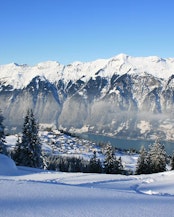Climate-neutral region Oberland-Ost

Climate-neutral region Oberland-Ost
Our Objective
The Oberland-Ost region aims to become climate-neutral by 2040. With its global standing as a well-known tourist destination encompassing part of a UNESCO World Heritage Site, it seeks to set a good example and contribute significantly to the transformation toward sustainable tourism. The goal is to show that it is possible to use and protect nature simultaneously.
Figures
The project was launched on January 1, 2021 and is currently in progress.
Summary
Regions in the Alps are disproportionately impacted by climate change. At the same time, they also contribute to the problem and therefore bear a particular responsibility. The Oberland-Ost region is ideally placed to lead by example. Until now, there has been no single initiative that served to define overarching objectives and connect the region’s various stakeholders and initiatives.
This project aims to show how a transformation process toward climate neutrality can be designed. In addition, it seeks to advance concrete initiatives and link together stakeholders from society, business, science, and politics.
In collaboration with: Office for Environment and Energy of the Canton of Bern (AUE)
Project Connections
Timeline
First key results
Project Update February 17, 2025
The project began with a scientific sub-project, in which various regional stakeholders developed a shared vision for a climate-neutral region, defined development paths for various sub-areas, and initiated the first specific project ideas. The entire process and results were documented in a brochure and a comprehensive final report (both in German), making the knowledge gained accessible to other regions. One key first result has been the creation of a coaching position for climate protection projects by the Regional Conference Oberland-Ost. The climate coach acts as a central point of contact for climate concerns while supporting and initiating dialogue platforms and implementation projects in the domains of energy, mobility, tourism, agriculture, nutrition, and communication. Various participation formats are being employed to network citizens, experts, and decision-makers while exchanging knowledge. More information:Klimaneutrale Region Oberland-Ost (Exchange platform deinklima.ch; in German) Local energy transition experiments for a low-carbon society (Project information on the website of the Centre for Development and Environment CDE) Klimaneutrale Region und Klimaprojektcoaching (Information about the project and the climate coach on the website of the Regional Conference Oberland-Ost; in German)
Media Mention, Uni Aktuell: Climate protection in the Oberland
Project Update June 5, 2024
Exerpt from UniAktuell Article by Pieter Poldervaart: Tourism and milk production are the two mainstays of the Jungfrau region. But climate change puts both sectors at risk. Together with the Wyss Academy for Nature, the Canton of Bern and the University of Bern, the 28 municipalities of the East Oberland region are looking for strategies for more climate protection.Avalanches and mudslides are just as much a part of the Alps as high fog is part of the Swiss Plateau. But now these things are becoming more and more frequent, observes Stefan Schweizer. The 59-year-old tells of a whole series of special weather events that have hit the region over the past two decades. In 2003, around 375 tons of rock buried the Chüebalm Tunnel near Iseltwald. In 2005, there was major flooding, which was followed by further floods in 2008, 2009 and 2011. “We’re used to snow avalanches here,” says Schweizer. But the fact that enormous masses of water increasingly gather and thunder down into the valley, flooding pastures and submerging cellars is new. Schweizer: “That’s what’s worrying us.”
Team
- Project contact
Project contact
Flurina Werthmüller
Scientific Collaborator


